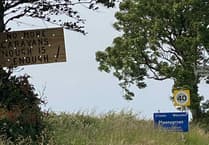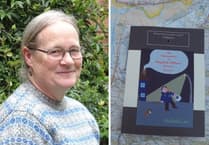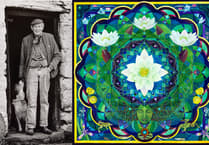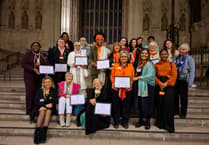An exhibition sponsored by Ceredigion MP Ben Lake, showcasing the stories of refugees in Wales, has gone on display in Westminster this week.
‘Refugees from National Socialism in Wales: learning from the past for the future’ has been co-curated by Dr Andrea Hammel and Dr Morris Brodie from Aberystwyth University’s Centre for the Movement of People, together with refugees and those who are assisting refugees with resettlement in Wales.
The exhibition traces the history of refugees in Wales from the 1930s until the present day. It tells the stories of those who fled from National Socialism in Central Europe to find sanctuary, drawing parallels with modern-day refugees. The exhibition includes artworks, objects, photographs, and literature created by refugees and those working alongside them, from across the decades.

The exhibition, first shown at the Aberystwyth Arts Centre, was created as part of the Imperial War Museums’ Second World War and Holocaust Partnership Programme, and funded by the National Lottery Heritage Fund.
Speaking at the exhibition launch on 24 May, Ben Lake MP said: “It’s a privilege to be able to formally open the exhibition and welcome you all here to what has already been a fantastic couple of days, and I’m very grateful to Andrea Hammel and Morris Brodie for making it all happen. I was very lucky to attend the exhibit in Aberystwyth Arts Centre and was struck by how powerful the exhibits were, and I think said then that whilst it’s good to have it in Aberystwyth it’s important to bring it to Westminster not just for politicians but for a wider audience to learn about the history.”
Lord Dubs, Labour Peer and former child refugee, recounted his experiences as one of the children saved by British humanitarian Nicholas Winton on the Kindertransport in 1939: “We were made so welcome by this little village, Llanwrtyd Wells. It was really a strong, emotional, educational experience to be there. There are so many memories that get lost and forgotten, And I think it’s really important to try and keep our memories of events because if we don’t do things like this they’ll be gone forever.”
Dr. Andrea Hammel expressed her thanks to the various organisations and contributors who helped make the event a reality “We’re very grateful to various organisations, including the Imperial War Museum and the Association of Jewish Refugees. I’m very pleased that it’s all come together and I’m very pleased that we’ve travelled from Aberystwyth to Cardiff and now to Westminster and look forward to its arrival in North Wales in June. What is really important to us is that the exhibition has contributions from refugees that live in Ceredigion now. Refugees from Syria, from Afghanistan and from Kuwait.”





Comments
This article has no comments yet. Be the first to leave a comment.